Charles E W Bean, Diaries, AWM38 3DRL 606/237/1 - October 1914 - 1918 - Part 9
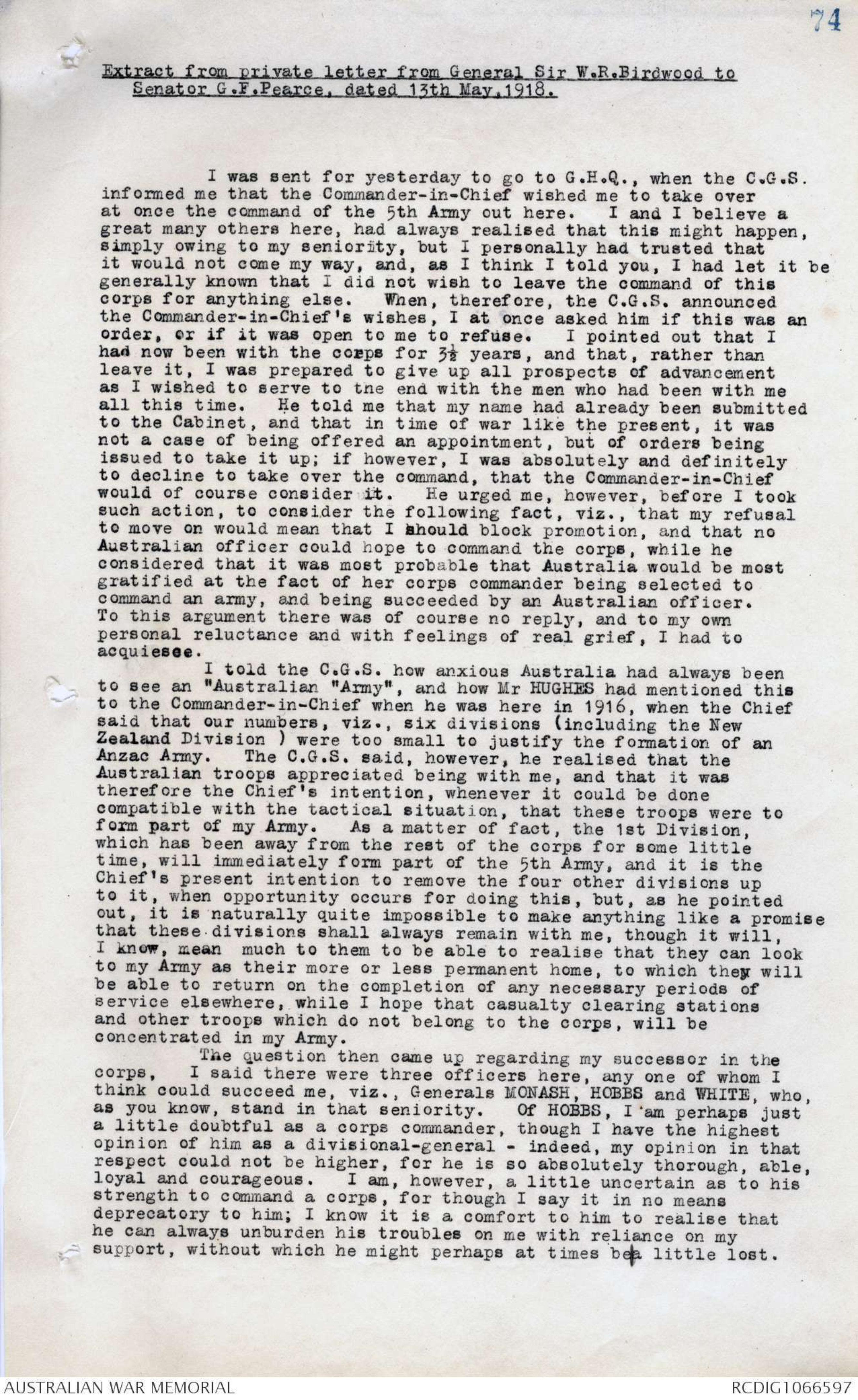
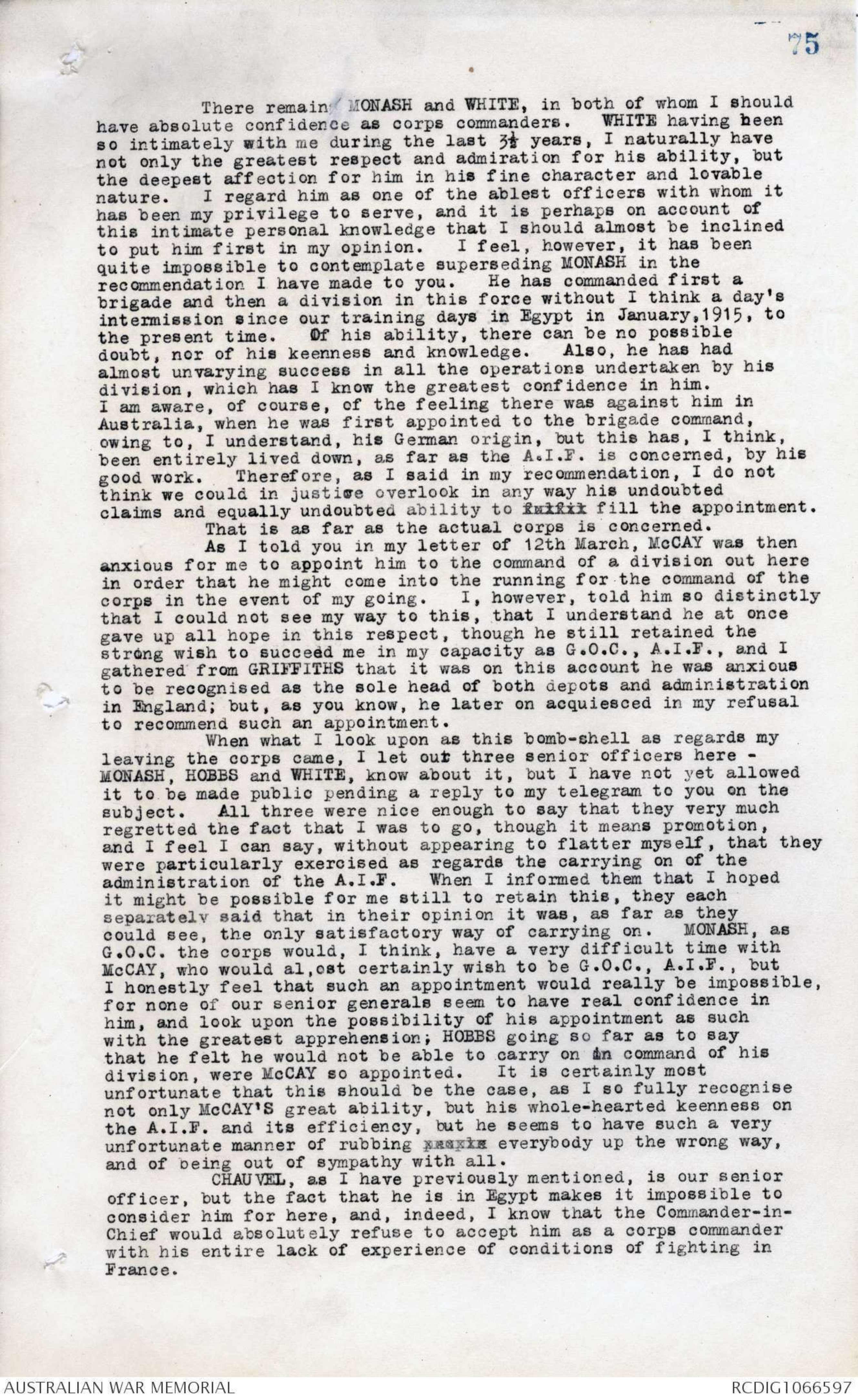
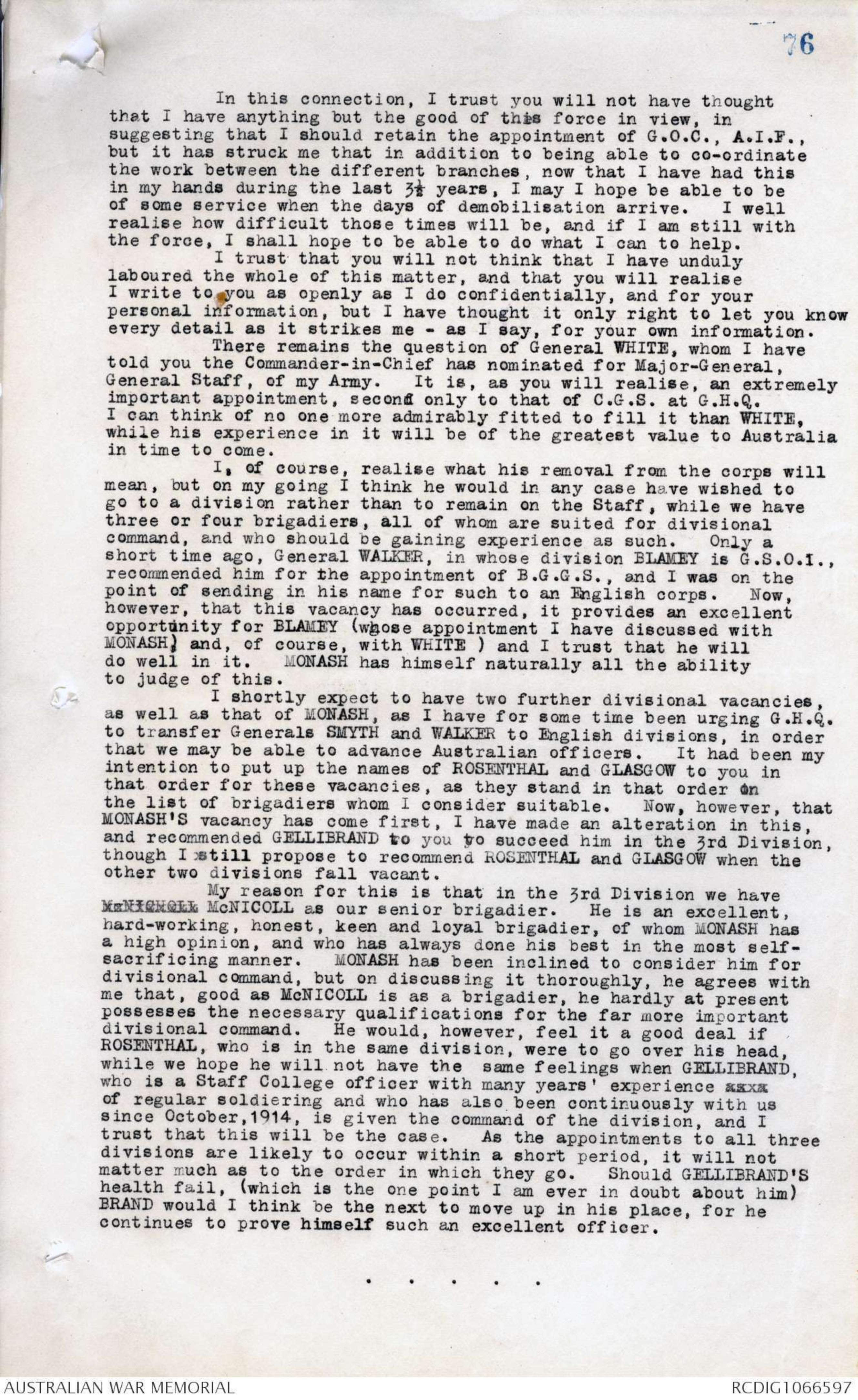
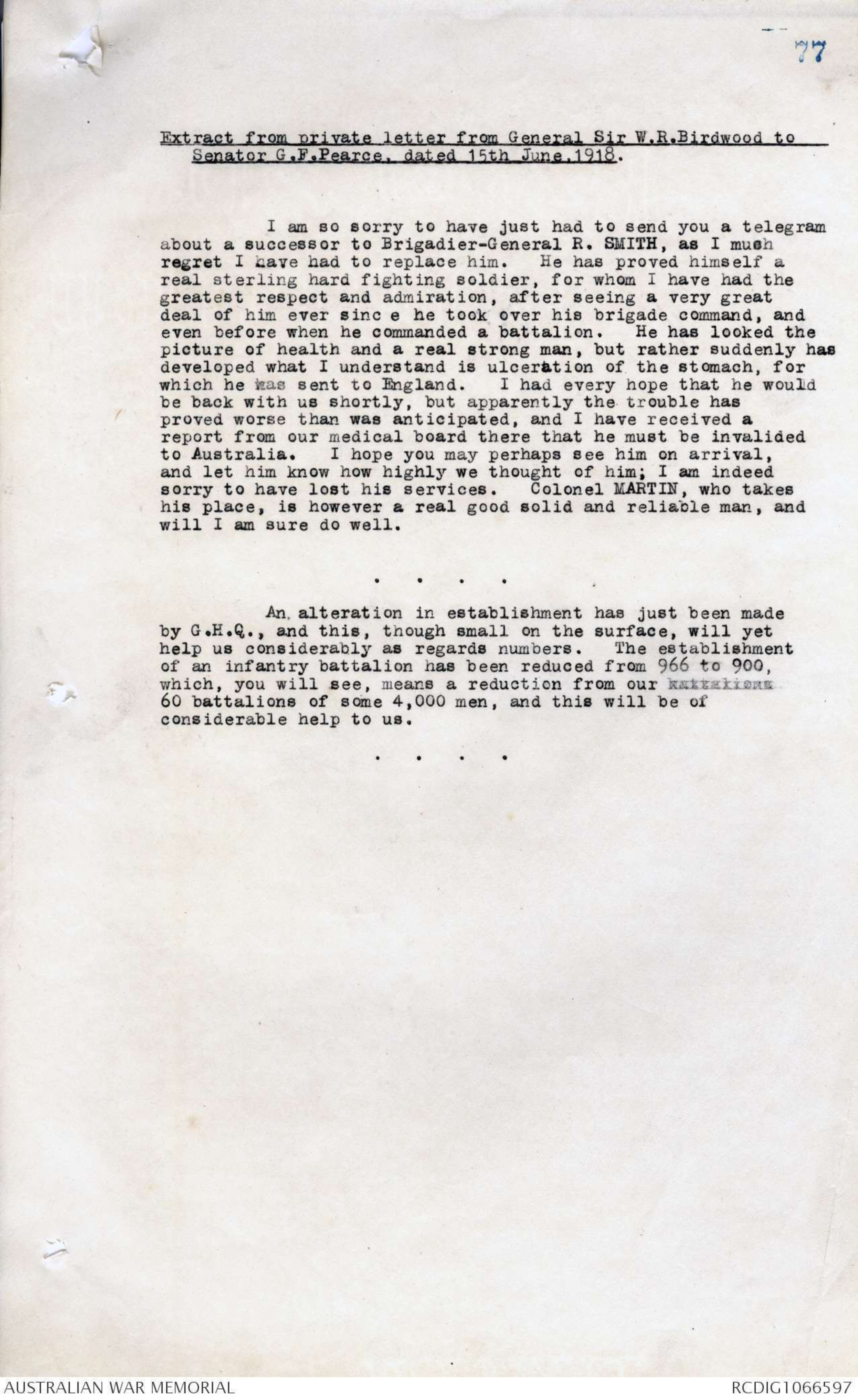
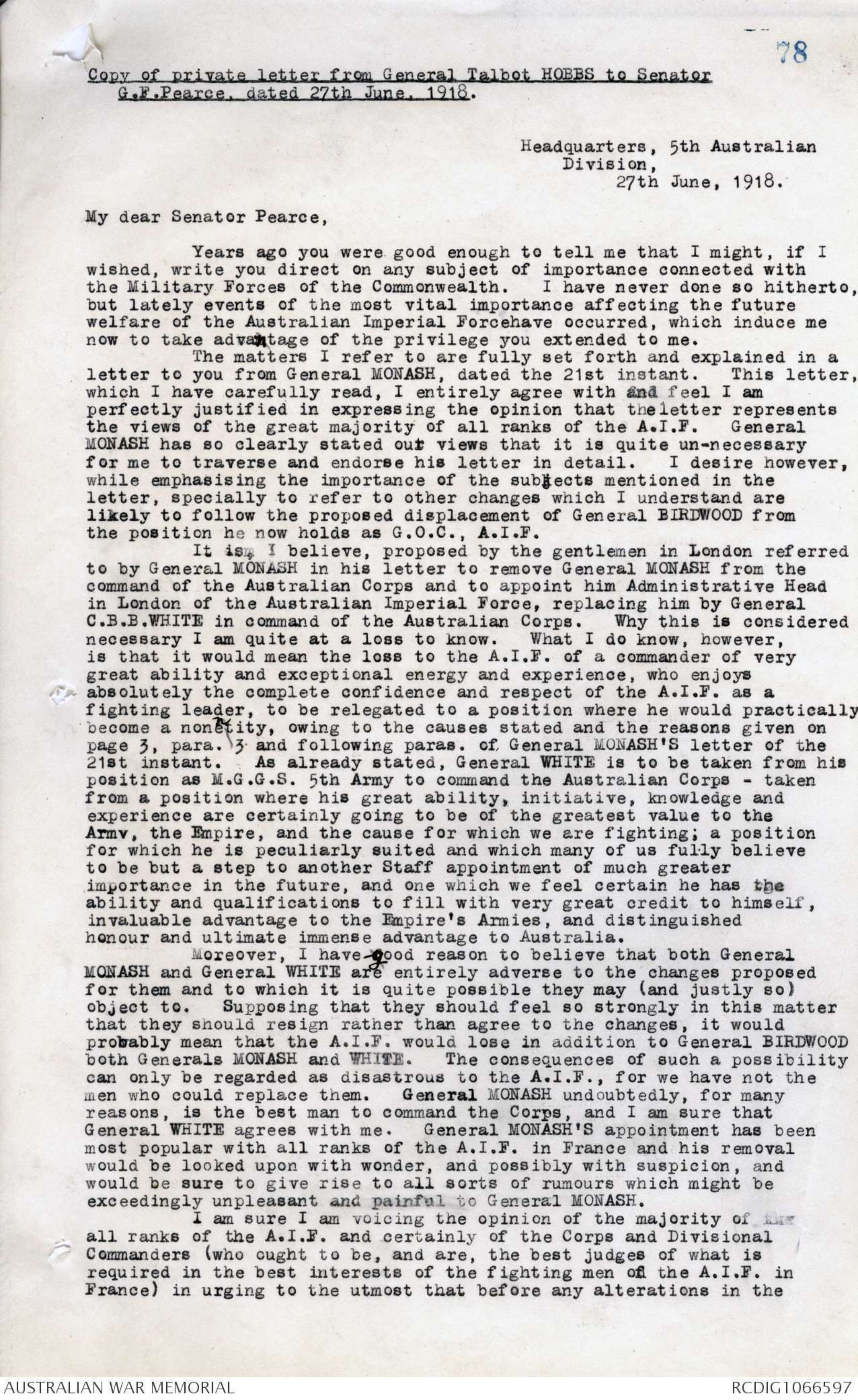
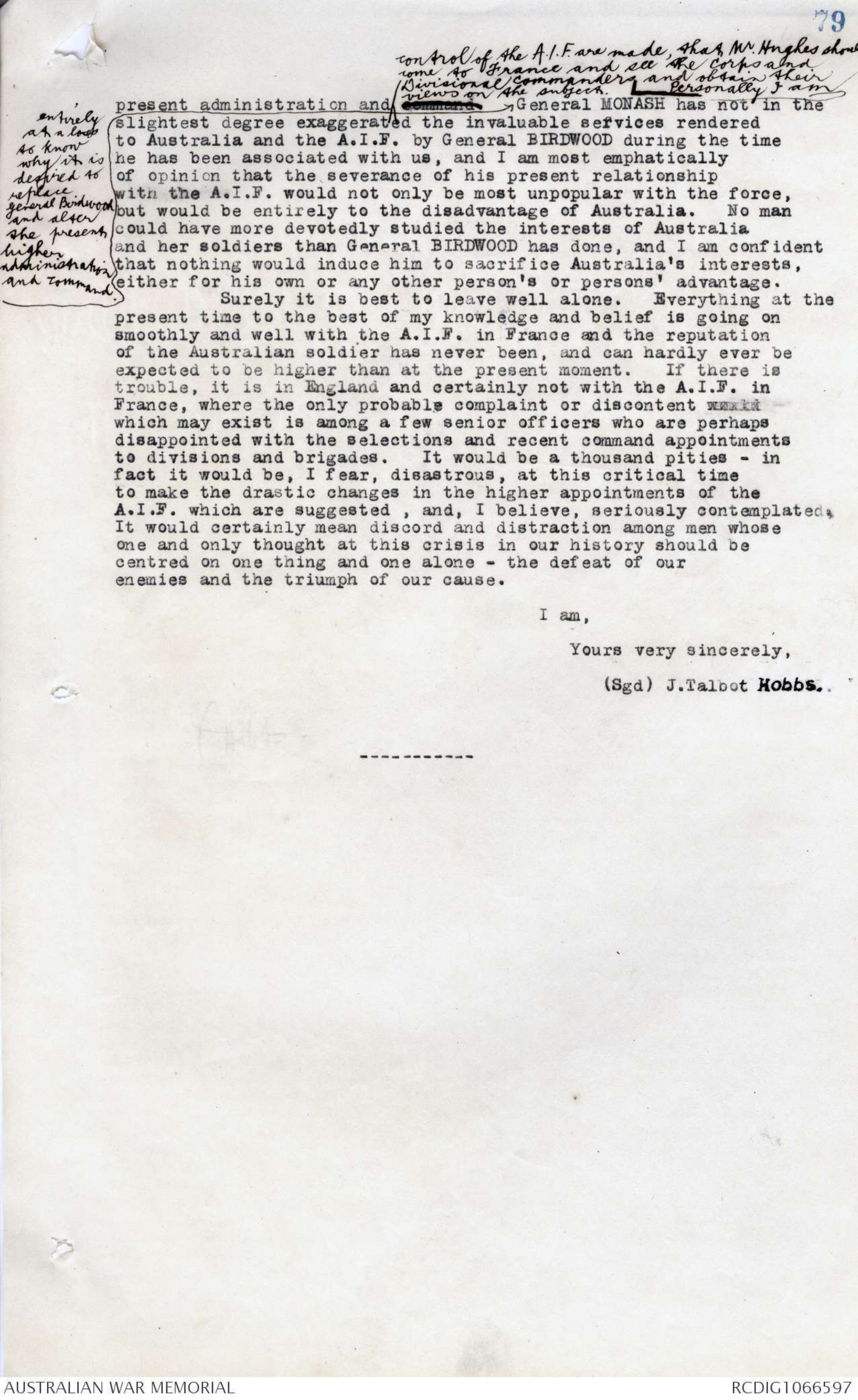
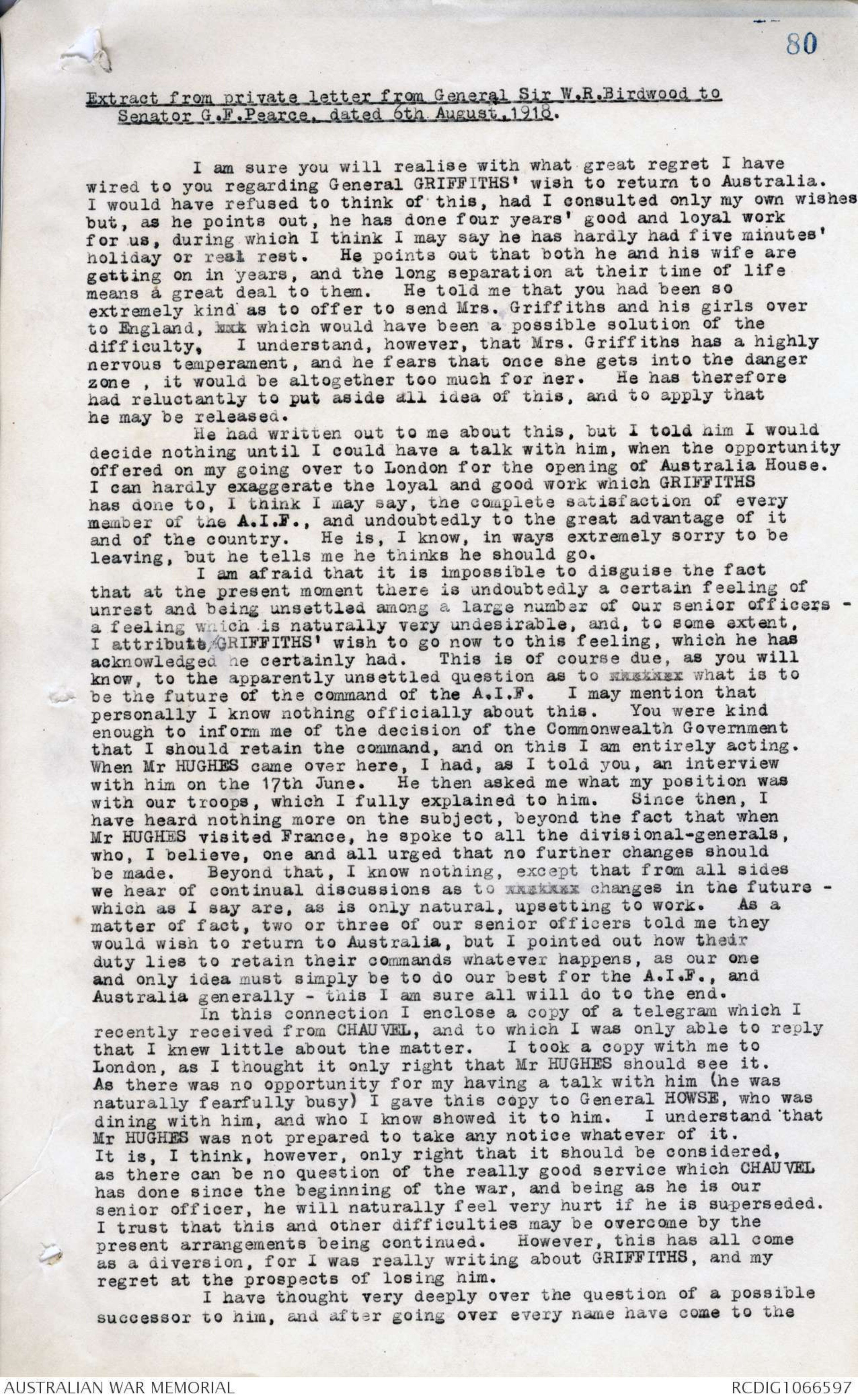
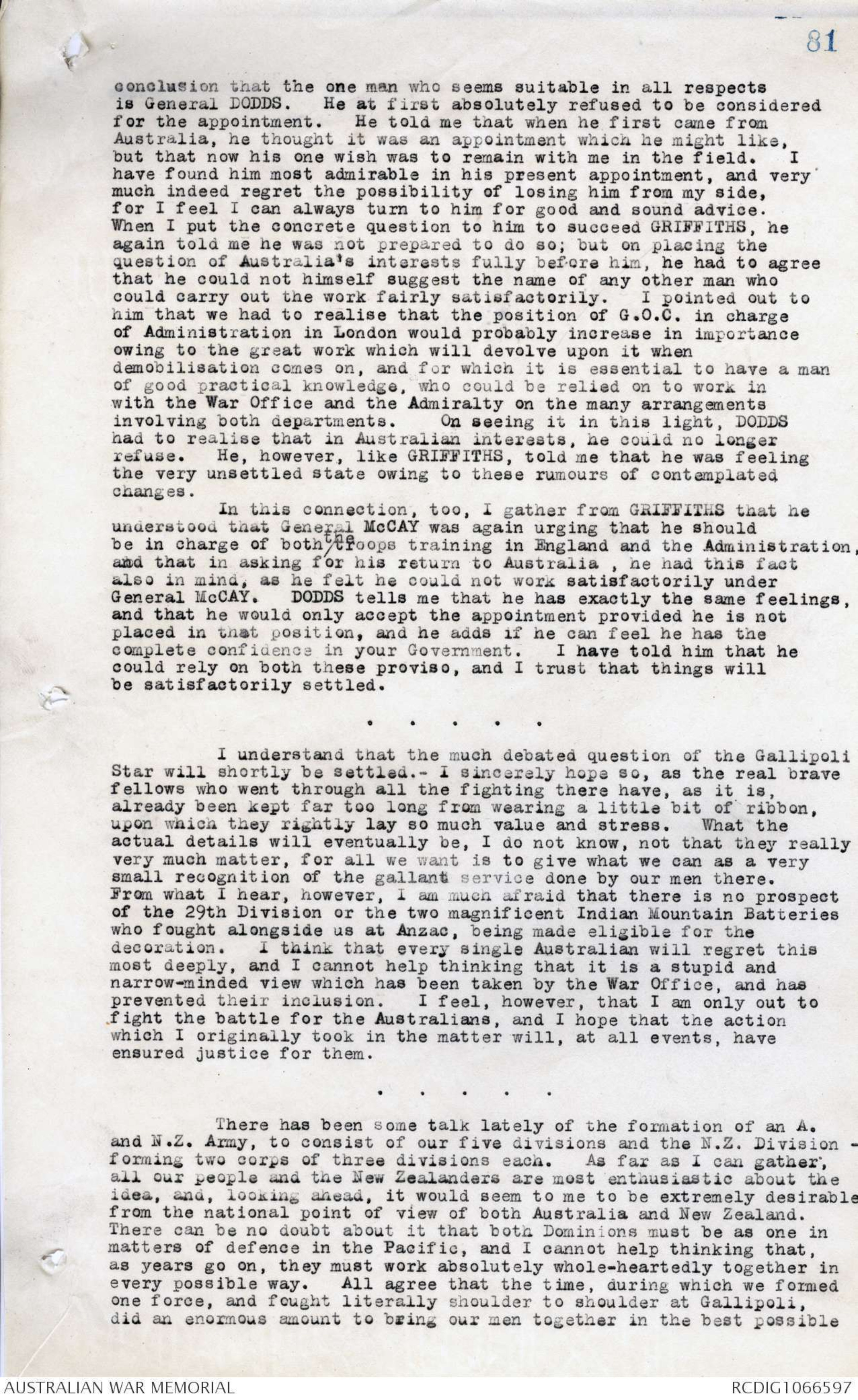
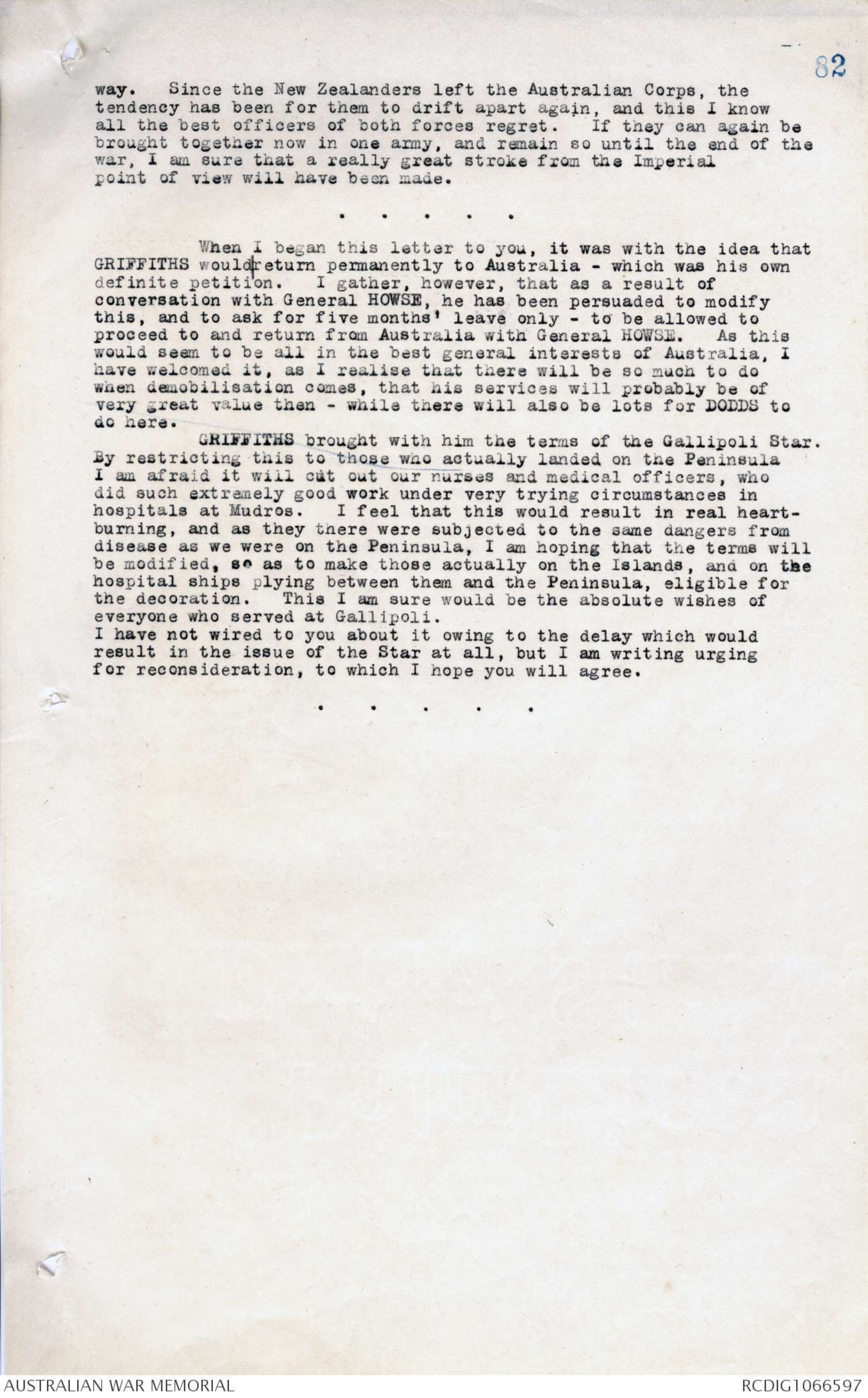
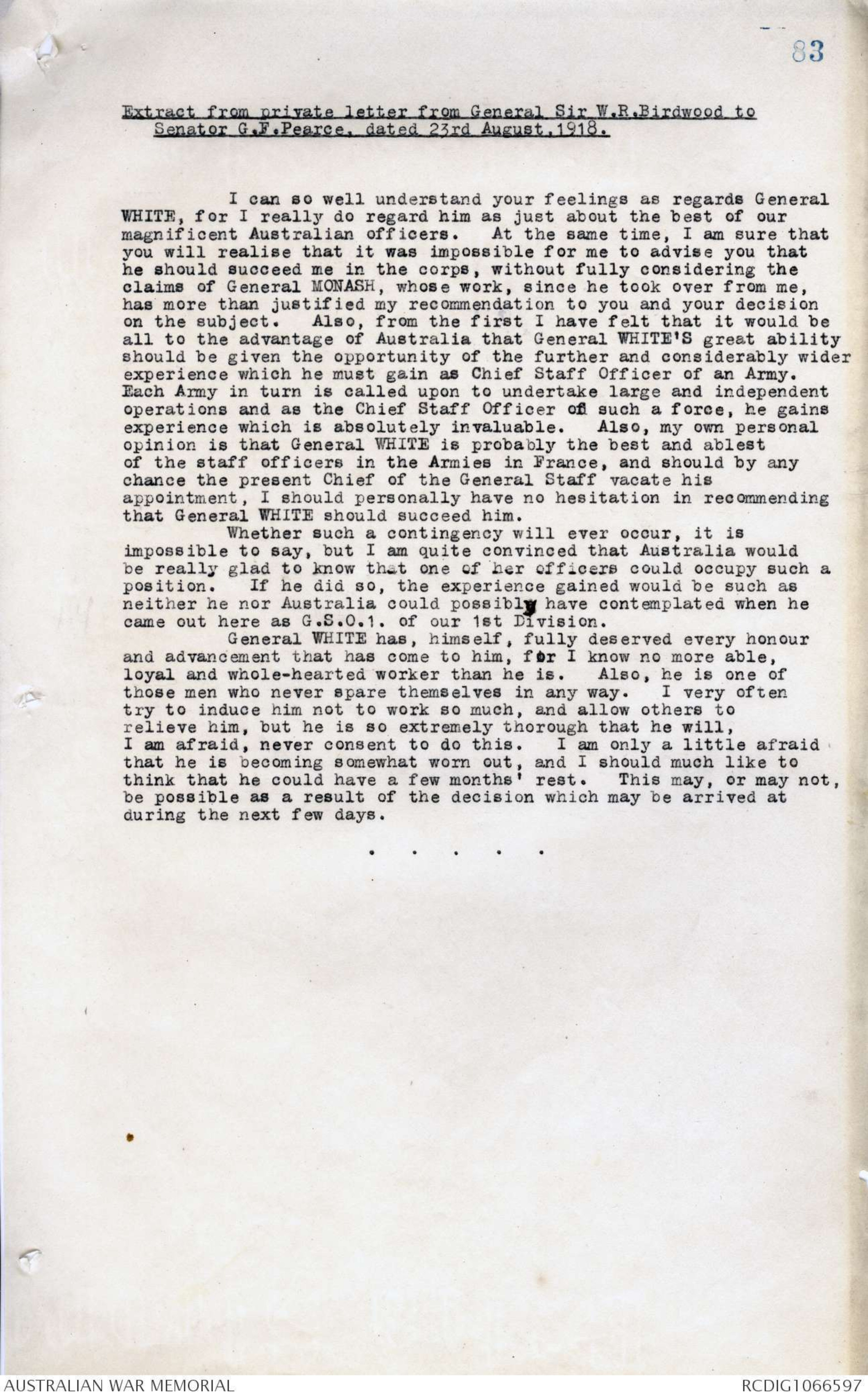
74
Extract from private letter from General Sir W.R.Birdwood to
Senator G.F.Pearce, dated 13th May, 1918.
I was sent for yesterday to go to G.H.Q., when the C.G.S.
informed me that the Commander-in-Chief wished me to take over
at once the command of the 5th Army out here. I and I believe a
great many others here, had always realised that this might happen,
simply owing to my seniority, but I personally had trusted that
it would not come my way, and, as I think I told you, I had let it be
generally known that I did not wish to leave the command of this
corps for anything else. When, therefore, the C.G.S. announced
the Commander-in-Chief's wishes, I at once asked him if this was an
order, or if it was open to me to refuse. I pointed out that I
had now been with the corps for 3½ years, and that, rather than
leave it, I was prepared to give up all prospects of advancement
as I wished to serve to the end with the men who had been with me
all this time. He told me that my name had already been submitted
to the Cabinet, and that in time of war like the present, it was
not a case of being offered an appointment, but of orders being
issued to take it up; if however, I was absolutely and definitely
to decline to take over the command, that the Commander-in-Chief
would of course consider it. He urged me, however, before I took
such action, to consider the following fact, viz., that my refusal
to move on would mean that I should block promotion, and that no
Australian officer could hope to command the corps, while he
considered that it was most probable that Australia would be most
gratified at the fact of her corps commander being selected to
command an army, and being succeeded by an Australian officer.
To this argument there was of course no reply, and to my own
personal reluctance and with feelings of real grief, I had to
acquiesce.
I told the C.G.S. how anxious Australia had always been
to see an "Australian "Army", and how Mr HUGHES had mentioned this
to the Commander-in-Chief when he was here in 1916, when the Chief
said that our numbers, viz., six divisions (including the New
Zealand Division ) were too small to justify the formation of an
Anzac Army. The C.G.S. said, however, he realised that the
Australian troops appreciated being with me, and that it was
therefore the Chief's intention, whenever it could be done
compatible with the tactical situation, that these troops were to
form part of my Army. As a matter of fact, the 1st Division,
which has been away from the rest of the corps for some little
time, will immediately form part of the 5th Army, and it is the
Chief's present intention to remove the four other divisions up
to it, when opportunity occurs for doing this, but, as he pointed
out, it is naturally quite impossible to make anything like a promise
that these divisions shall always remain with me, though it will,
I know, mean much to them to be able to realise that they can look
to my Army as their more or less permanent home, to which they will
be able to return on the completion of any necessary periods of
service elsewhere, while I hope that casualty clearing stations
and other troops which do not belong to the corps, will be
concentrated in my Army.
The question then came up regarding my successor in the
corps, I said there were three officers here, any one of whom I
think could succeed me, viz., Generals MONASH, HOBBS and WHITE, who,
as you know, stand in that seniority. Of HOBBS, I 'am perhaps just
a little doubtful as a corps commander, though I have the highest
opinion of him as a divisional-general - indeed, my opinion in that
respect could not be higher, for he is so absolutely thorough, able,
loyal and courageous. I am, however, a little uncertain as to his
strength to command a corps, for though I say it in no means
deprecatory to him; I know it is a comfort to him to realise that
he can always unburden his troubles on me with reliance on my
support, without which he might perhaps at times be/a little lost.
75
There remains MONASH and WHITE, in both of whom I should
have absolute confidence as corps commanders. WHITE having been
so intimately with me during the last 3½ years, I naturally have
not only the greatest respect and admiration for his ability, but
the deepest affection for him in his fine character and lovable
nature. I regard him as one of the ablest officers with whom it
has been my privilege to serve, and it is perhaps on account of
this intimate personal knowledge that I should almost be inclined
to put him first in my opinion. I feel, however, it has been
quite impossible to contemplate superseding MONASH in the
recommendation I have made to you. He has commanded first a
brigade and then a division in this force without I think a day's
intermission since our training days in Egypt in January, 1915, to
the present time. Of his ability, there can be no possible
doubt, nor of his keenness and knowledge. Also, he has had
almost unvarying success in all the operations undertaken by his
division, which has I know the greatest confidence in him.
I am aware, of course, of the feeling there was against him in
Australia, when he was first appointed to the brigade command,
owing to, I understand, his German origin, but this has, I think,
been entirely lived down, as far as the A.I.F. is concerned, by his
good work. Therefore, as I said in my recommendation, I do not
think we could in justice overlook in any way his undoubted
claims and equally undoubted ability to fulfil fill the appointment.
That is as far as the actual corps is concerned.
As I told you in my letter of 12th March, McCAY was then
anxious for me to appoint him to the command of a division out here
in order that he might come into the running for the command of the
corps in the event of my going. I, however, told him so distinctly
that I could not see my way to this, that I understand he at once
gave up all hope in this respect, though he still retained the
strong wish to succeed me in my capacity as G.O.C., A.I.F., and I
gathered from GRIFFITHS that it was on this account he was anxious
to be recognised as the sole head of both depots and administration
in England; but, as you know, he later on acquiesced in my refusal
to recommend such an appointment.
When what I look upon as this bomb-shell as regards my
leaving the corps came, I let our three senior officers here -
MONASH, HOBBS and WHITE, know about it, but I have not yet allowed
it to be made public pending a reply to my telegram to you on the
subject. All three were nice enough to say that they very much
regretted the fact that I was to go, though it means promotion,
and I feel I can say, without appearing to flatter myself, that they
were particularly exercised as regards the carrying on of the
administration of the A.I.F. When I informed them that I hoped
it might be possible for me still to retain this, they each
separately said that in their opinion it was, as far as they
could see, the only satisfactory way of carrying on. MONASH, as
G.O.C. the corps would, I think, have a very difficult time with
McCAY, who would al,ost certainly wish to be G.O.C., A.I.F., but
I honestly feel that such an appointment would really be impossible,
for none of our senior generals seem to have real confidence in
him, and look upon the possibility of his appointment as such
with the greatest apprehension; HOBBS going so far as to say
that he felt he would not be able to carry on in command of his
division, were McCAY so appointed. It is certainly most
unfortunate that this should be the case, as I so fully recognise
not only McCAY'S great ability, but his whole-hearted keenness on
the A.I.F. and its efficiency, but he seems to have such a very
unfortunate manner of rubbing people everybody up the wrong way,
and of being out of sympathy with all.
CHAUVEL, as I have previously mentioned, is our senior
officer, but the fact that he is in Egypt makes it impossible to
consider him for here, and, indeed, I know that the Commander-in-Chief
would absolutely refuse to accept him as a corps commander
with his entire lack of experience of conditions of fighting in
France.
76
In this connection, I trust you will not have thought
that I have anything but the good of this force in view, in
suggesting that I should retain the appointment of G.O.C., A.I.F.,
but it has struck me that in addition to being able to co-ordinate
the work between the different branches, now that I have had this
in my hands during the last 3½ years, I may I hope be able to be
of some service when the days of demobilisation arrive. I well
realise how difficult those times will be, and if I am still with
the force, I shall hope to be able to do what I can to help.
I trust that you will not think that I have unduly
laboured the whole of this matter, and that you will realise
I write to you as openly as I do confidentially, and for your
personal information, but I have thought it only right to let you know
every detail as it strikes me - as I say, for your own information.
There remains the question of General WHITE, whom I have
told you the Commander-in-Chief has nominated for Major-General,
General Staff, of my Army. It is, as you will realise, an extremely
important appointment, second only to that of C.G.S. at G.H.Q.
I can think of no one more admirably fitted to fill it than WHITE,
while his experience in it will be of the greatest value to Australia
in time to come.
I, of course, realise what his removal from the corps will
mean, but on my going I think he would in any case have wished to
go to a division rather than to remain on the Staff, while we have
three or four brigadiers, all of whom are suited for divisional
command, and who should be gaining experience as such. Only a
short time ago, General WALKER, in whose division BLAMEY is G.S.O.!.,
recommended him for the appointment of B.G.G.S., and I was on the
point of sending in his name for such to an English corps. Now,
however, that this vacancy has occurred, it provides an excellent
opportunity for BLAMEY (whose appointment I have discussed with
MONASH) and, of course, with WHITE ) and I trust that he will
do well in it. MONASH has himself naturally all the ability
to judge of this.
I shortly expect to have two further divisional vacancies ,
as well as that of MONASH, as I have for some time been urging G.H.Q.
to transfer Generals SMYTH and WALKER to English divisions, in order
that we may be able to advance Australian officers. It had been my
intention to put up the names of ROSENTHAL and GLASGOW to you in
that order for these vacancies, as they stand in that order on
the list of brigadiers whom I consider suitable. Now, however, that
MONASH'S vacancy has come first, I have made an alteration in this,
and recommended GELLIBRAND to you to succeed him in the 3rd Division,
though I still propose to recommend ROSENTHAL and GLASGOW when the
other two divisions fall vacant.
My reason for this is that in the 3rd Division we have McNICHOLL McNICOLL as our senior brigadier. He is an excellent,
hard-working, honest, keen and loyal brigadier, of whom MONASH has
a high opinion, and who has always done his best in the most self-sacrificing
manner. MONASH has been inclined to consider him for
divisional command, but on discussing it thoroughly, he agrees with
me that, good as McNICOLL is as a brigadier, he hardly at present
possesses the necessary qualifications for the far more important
divisional command. He would, however, feel it a good deal if
ROSENTHAL, who is in the same division, were to go over his head,
while we hope he will not have the same feelings when GELLIBRAND,
who is a Staff College officer with many years' experience as a
of regular soldiering and who has also been continuously with us
since October, 1914, is given the command of the division, and I
trust that this will be the case. As the appointments to all three
divisions are likely to occur within a short period, it will not
matter much as to the order in which they go. Should GELLIBRAND'S
health fail, (which is the one point I am ever in doubt about him)
BRAND would I think be the next to move up in his place, for he
continues to prove himself such an excellent officer.
77
Extract from private letter from General Sir W.R.Birdwood to
Senator G.F.Pearce, dated 15th June, 1918.
I am so sorry to have just had to send you a telegram
about a successor to Brigadier-General R. SMITH, as I much
regret I have had to replace him. He has proved himself a
real sterling hard fighting soldier, for whom I have had the
greatest respect and admiration, after seeing a very great
deal of him ever since he took over his brigade command, and
even before when he commanded a battalion. He has looked the
picture of health and a real strong man, but rather suddenly has
developed what I understand is ulceration of the stomach, for
which he was sent to England. I had every hope that he would
be back with us shortly, but apparently the trouble has
proved worse than was anticipated, and I have received a
report from our medical board there that he must be invalided
to Australia. I hope you may perhaps see him on arrival,
and let him know how highly we thought of him; I am indeed
sorry to have lost his services. Colonel MARTIN, who takes
his place, is however a real good solid and reliable man, and
will I am sure do well.
An alteration in establishment has just been made
by G.H.Q., and this, though small on the surface, will yet
help us considerably as regards numbers. The establishment
of an infantry battalion has been reduced from 966 to 900,
which, you will see, means a reduction from our battalions
60 battalions of some 4,000 men, and this will be of
considerable help to us.
78
Copy of private letter from General Talbot HOBBS to Senator
G.F.Pearce, dated 27th June, 1918.
Headquarters, 5th Australian
Division,
27th June, 1918.
My dear Senator Pearce,
Years ago you were good enough to tell me that I might, if I
wished, write you direct on any subject of importance connected with
the Military Forces of the Commonwealth. I have never done so hitherto,
but lately events of the most vital importance affecting the future
welfare of the Australian Imperial Forcehave occurred, which induce me
now to take advantage of the privilege you extended to me.
The matters I refer to are fully set forth and explained in a
letter to you from General MONASH, dated the 21st instant. This letter,
which I have carefully read, I entirely agree with and feel I am
perfectly justified in expressing the opinion that theletter represents
the views of the great majority of all ranks of the A.I.F. General
MONASH has so clearly stated our views that it is quite un-necessary
for me to traverse and endorse his letter in detail. I desire however,
while emphasising the importance of the subjects mentioned in the
letter, specially to refer to other changes which I understand are
likely to follow the proposed displacement of General BIRDWOOD from
the position he now holds as G.O.C., A.I.F.
It is, I believe, proposed by the gentlemen in London referred
to by General MONASH in his letter to remove General MONASH from the
command of the Australian Corps and to appoint him Administrative Head
in London of the Australian Imperial Force, replacing him by General
C.B.B.WHITE in command of the Australian Corps. Why this is considered
necessary I am quite at a loss to know. What I do know, however,
is that it would mean the loss to the A.I.F. of a commander of very
great ability and exceptional energy and experience, who enjoys
absolutely the complete confidence and respect of the A.I.F. as a
fighting leader, to be relegated to a position where he would practically
become a none^ntity, owing to the causes stated and the reasons given on
page 3, para. 3 and following paras. of General MONASH'S letter of the
21st instant. As already stated, General WHITE is to be taken from his
position as M.G.G.S. 5th Army to command the Australian Corps - taken
from a position where his great ability, initiative, knowledge and
experience are certainly going to be of the greatest value to the
Army, the Empire, and the cause for which we are fighting; a position
for which he is peculiarly suited and which many of us fully believe
to be but a step to another Staff appointment of much greater
importance in the future, and one which we feel certain he has the
ability and qualifications to fill with very great credit to himself,
invaluable advantage to the Empire's Armies, and distinguished
honour and ultimate immense advantage to Australia.
Moreover, I have good reason to believe that both General
MONASH and General WHITE are entirely adverse to the changes proposed
for them and to which it is quite possible they may (and justly so)
object to. Supposing that they should feel so strongly in this matter
that they should resign rather than agree to the changes, it would
probably mean that the A.I.F. would lose in addition to General BIRDWOOD
both Generals MONASH and WHITE. The consequences of such a possibility
can only be regarded as disastrous to the A.I.F., for we have not the
men who could replace them. General MONASH undoubtedly, for many
reasons, is the best man to command the Corps, and I am sure that
General WHITE agrees with me. General MONASH'S appointment has been
most popular with all ranks of the A.I.F. in France and his removal
would be looked upon with wonder, and possibly with suspicion, and
would be sure to give rise to all sorts of rumours which might be
exceedingly unpleasant and painful to General MONASH.
I am sure I am voicing the opinion of the majority of the
all ranks of the A.I.F. and certainly of the Corps and Divisional
Commanders (who ought to be, and are, the best judges of what is
required in the best interests of the fighting men of the A.I.F. in
France) in urging to the utmost that before any alterations in the
79
present administration and command [*control of the A.I.F are made, that Mr. Hughes should
come to France and see the Corps and
Divisional Commanders and obtain their
views on the subject. Personally I am*]
[*entirely
at a loss
to know
why it is
desired to
replace
General Birdwood
and alter
the present
higher
administration
and command.*] General MONASH has not in the
slightest degree exaggerated the invaluable services rendered
to Australia and the A.I.F. by General BIRDWOOD during the time
he has been associated with us, and I am most emphatically
of opinion that the severance of his present relationship
with the A.I.F. would not only be most unpopular with the force,
but would be entirely to the disadvantage of Australia. No man
could have more devotedly studied the interests of Australia
and her soldiers than General BIRDWOOD has done, and I am confident
that nothing would induce him to sacrifice Australia's interests,
either for his own or any other person's or persons' advantage.
Surely it is best to leave well alone. Everything at the
present time to the best of my knowledge and belief is going on
smoothly and well with the A.I.F. in France and the reputation
of the Australian soldier has never been, and can hardly ever be
expected to be higher than at the present moment. If there is
trouble, it is in England and certainly not with the A.I.F. in
France, where the only probable complaint or discontent would
which may exist is among a few senior officers who are perhaps
disappointed with the selections and recent command appointments
to divisions and brigades. It would be a thousand pities - in
fact it would be, I fear, disastrous, at this critical time
to make the drastic changes in the higher appointments of the
A.I.F. which are suggested , and, I believe, seriously contemplated.
It would certainly mean discord and distraction among men whose
one and only thought at this crisis in our history should be
centred on one thing and one alone - the defeat of our
enemies and the triumph of our cause.
I am,
Yours very sincerely,
(Sgd) J.Talbot Hobbs.
80
Extract from private letter from General Sir W.R.Birdwood to
Senator G.F.Pearce, dated 6th August, 1918.
I am sure you will realise with what great regret I have
wired to you regarding General GRIFFITHS' wish to return to Australia.
I would have refused to think of this, had I consulted only my own wishes
but, as he points out, he has done four years' good and loyal work
for us, during which I think I may say he has hardly had five minutes'
holiday or real rest. He points out that both he and his wife are
getting on in years, and the long separation at their time of life
means a great deal to them. He told me that you had been so
extremely kind as to offer to send Mrs. Griffiths and his girls over
to England, but which would have been a possible solution of the
difficulty, I understand, however, that Mrs. Griffiths has a highly
nervous temperament, and he fears that once she gets into the danger
zone , it would be altogether too much for her. He has therefore
had reluctantly to put aside all idea of this, and to apply that
he may be released.
He had written out to me about this, but I told him I would
decide nothing until I could have a talk with him, when the opportunity
offered on my going over to London for the opening of Australia House.
I can hardly exaggerate the loyal and good work which GRIFFITHS
has done to, I think I may say, the complete satisfaction of every
member of the A.I.F., and undoubtedly to the great advantage of it
and of the country. He is, I know, in ways extremely sorry to be
leaving, but he tells me he thinks he should go.
I am afraid that it is impossible to disguise the fact
that at the present moment there is undoubtedly a certain feeling of
unrest and being unsettled among a large number of our senior officers -
a feeling which is naturally very undesirable, and, to some extent,
I attribute/GRIFFITHS' wish to go now to this feeling, which he has
acknowledged he certainly had. This is of course due, as you will
know, to the apparently unsettled question as to whether what is to
be the future of the command of the A.I.F. I may mention that
personally I know nothing officially about this. You were kind
enough to inform me of the decision of the Commonwealth Government
that I should retain the command, and on this I am entirely acting.
When Mr HUGHES came over here, I had, as I told you, an interview
with him on the 17th June. He then asked me what my position was
with our troops, which I fully explained to him. Since then, I
have heard nothing more on the subject, beyond the fact that when
Mr HUGHES visited France, he spoke to all the divisional-generals ,
who, I believe, one and all urged that no further changes should
be made. Beyond that, I know nothing, except that from all sides
we hear of continual discussions as to whether changes in the future -
which as I say are, as is only natural, upsetting to work. As a
matter of fact, two or three of our senior officers told me they
would wish to return to Australia, but I pointed out how their
duty lies to retain their commands whatever happens, as our one
and only idea must simply be to do our best for the A.I.F., and
Australia generally - this I am sure all will do to the end.
In this connection I enclose a copy of a telegram which I
recently received from CHAUVEL, and to which I was only able to reply
that I knew little about the matter. I took a copy with me to
London, as I thought it only right that Mr HUGHES should see it.
As there was no opportunity for my having a talk with him (he was
naturally fearfully busy) I gave this copy to General HOWSE, who was
dining with him, and who I know showed it to him. I understand that
Mr HUGHES was not prepared to take any notice whatever of it.
It is, I think, however, only right that it should be considered,
as there can be no question of the really good service which CHAUVEL
has done since the beginning of the war, and being as he is our
senior officer, he will naturally feel very hurt if he is superseded.
I trust that this and other difficulties may be overcome by the
present arrangements being continued. However, this has all come
as a diversion, for I was really writing about GRIFFITHS, and my
regret at the prospects of losing him.
I have thought very deeply over the question of a possible
successor to him, and after going over every name have come to the
81
conclusion that the one man who seems suitable in all respects
is General DODDS. He at first absolutely refused to be considered
for the appointment. He told me that when he first came from
Australia, he thought it was an appointment which he might like,
but that now his one wish was to remain with me in the field. I
have found him most admirable in his present appointment, and very
much indeed regret the possibility of losing him from my side,
for I feel I can always turn to him for good and sound advice.
When I put the concrete question to him to succeed GRIFFITHS, he
again told me he was not prepared to do so; but on placing the
question of Australia's interests fully before him, he had to agree
that he could not himself suggest the name of any other man who
could carry out the work fairly satisfactorily. I pointed out to
him that we had to realise that the position of G.O.C. in charge
of Administration in London would probably increase in importance
owing to the great work which will devolve upon it when
demobilisation comes on, and for which it is essential to have a man
of good practical knowledge, who could be relied on to work in
with the War Office and the Admiralty on the many arrangements
involving both departments. On seeing it in this light, DODDS
had to realise that in Australian interests, he could no longer
refuse. He, however, like GRIFFITHS, told me that he was feeling
the very unsettled state owing to these rumours of contemplated
changes.
In this connection, too, I gather from GRIFFITHS that he
understood that General McCAY was again urging that he should
be in charge of both ^the troops training in England and the Administration,
and that in asking for his return to Australia , he had this fact
also in mind, as he felt he could not work satisfactorily under
General McCAY. DODDS tells me that he has exactly the same feelings,
and that he would only accept the appointment provided he is not
placed in that position, and he adds if he can feel he has the
complete confidence in your Government. I have told him that he
could rely on both these proviso, and I trust that things will
be satisfactorily settled.
I understand that the much debated question of the Gallipoli
Star will shortly be settled.- I sincerely hope so, as the real brave
fellows who went through all the fighting there have, as it is,
already been kept far too long from wearing a little bit of ribbon,
upon which they rightly lay so much value and stress. What the
actual details will eventually be, I do not know, not that they really
very much matter, for all we want is to give what we can as a very
small recognition of the gallant service done by our men there.
From what I hear, however, I am much afraid that there is no prospect
of the 29th Division or the two magnificent Indian Mountain Batteries
who fought alongside us at Anzac, being made eligible for the
decoration. I think that every single Australian will regret this
most deeply, and I cannot help thinking that it is a stupid and
narrow-minded view which has been taken by the War Office, and has
prevented their inclusion. I feel, however, that I am only out to
fight the battle for the Australians, and I hope that the action
which I originally took in the matter will, at all events, have
ensured justice for them.
There has been some talk lately of the formation of an A.
and N.Z. Army, to consist of our five divisions and the N.Z. Division -
forming two corps of three divisions each. As far as I can gather,
all our people and the New Zealanders are most enthusiastic about the
idea, and, looking ahead, it would seem to me to be extremely desirable
from the national point of view of both Australia and New Zealand.
There can be no doubt about it that both Dominions must be as one in
matters of defence in the Pacific, and I cannot help thinking that,
as years go on, they must work absolutely whole-heartedly together in
every possible way. All agree that the time, during which we formed
one force, and fought literally shoulder to shoulder at Gallipoli,
did an enormous amount to bring our men together in the best possible
82
way. Since the New Zealanders left the Australian Corps, the
tendency has been for them to drift apart again, and this I know
all the best officers of both forces regret. If they can again be
brought together now in one army, and remain so until the end of the
war, I am sure that a really great stroke from the Imperial
point of view will have been made.
When I began this letter to you, it was with the idea that
GRIFFITHS would/return permanently to Australia - which was his own
definite petition. I gather, however, that as a result of
conversation with General HOWSE, he has been persuaded to modify
this, and to ask for five months' leave only - to be allowed to
proceed to and return from Australia with General HOWSE. As this
would seem to be all in the best general interests of Australia, I
have welcomed it, as I realise that there will be so much to do
when demobilisation comes, that his services will probably be of
very great value then - while there will also be lots for DODDS to
do here.
GRIFFITHS brought with him the terms of the Gallipoli Star.
By restricting this to those who actually landed on the Peninsula
I am afraid it will cut out our nurses and medical officers, who
did such extremely good work under very trying circumstances in
hospitals at Mudros. I feel that this would result in real heart-burning,
and as they there were subjected to the same dangers from
disease as we were on the Peninsula, I am hoping that the terms will
be modified, so as to make those actually on the Islands, and on the
hospital ships plying between them and the Peninsula, eligible for
the decoration. This I am sure would be the absolute wishes of
everyone who served at Gallipoli.
I have not wired to you about it owing to the delay which would
result in the issue of the Star at all, but I am writing urging
for reconsideration, to which I hope you will agree.
83
Extract from private letter from General Sir W.R.Birdwood to
Senator G.F.Pearce, dated 23rd August, 1918.
I can so well understand your feelings as regards General
WHITE, for I really do regard him as just about the best of our
magnificent Australian officers. At the same time, I am sure that
you will realise that it was impossible for me to advise you that
he should succeed me in the corps, without fully considering the
claims of General MONASH, whose work, since he took over from me,
has more than justified my recommendation to you and your decision
on the subject. Also, from the first I have felt that it would be
all to the advantage of Australia that General WHITE'S great ability
should be given the opportunity of the further and considerably wider
experience which he must gain as Chief Staff Officer of an Army.
Each Army in turn is called upon to undertake large and independent
operations and as the Chief Staff Officer of such a force, he gains
experience which is absolutely invaluable. Also, my own personal
opinion is that General WHITE is probably the best and ablest
of the staff officers in the Armies in France, and should by any
chance the present Chief of the General Staff vacate his
appointment, I should personally have no hesitation in recommending
that General WHITE should succeed him.
Whether such a contingency will ever occur, it is
impossible to say, but I am quite convinced that Australia would
be really glad to know that one of her officers could occupy such a
position. If he did so, the experience gained would be such as
neither he nor Australia could possibly have contemplated when he
came out here as G.S.O.1. of our 1st Division.
General WHITE has, himself, fully deserved every honour
and advancement that has come to him, for I know no more able,
loyal and whole-hearted worker than he is. Also, he is one of
those men who never spare themselves in any way. I very often
try to induce him not to work so much, and allow others to
relieve him, but he is so extremely thorough that he will,
I am afraid, never consent to do this. I am only a little afraid
that he is becoming somewhat worn out, and I should much like to
think that he could have a few months' rest. This may, or may not,
be possible as a result of the decision which may be arrived at
during the next few days.
 Not Yet Replaced By AI
Not Yet Replaced By AIThis transcription item is now locked to you for editing. To release the lock either Save your changes or Cancel.
This lock will be automatically released after 60 minutes of inactivity.